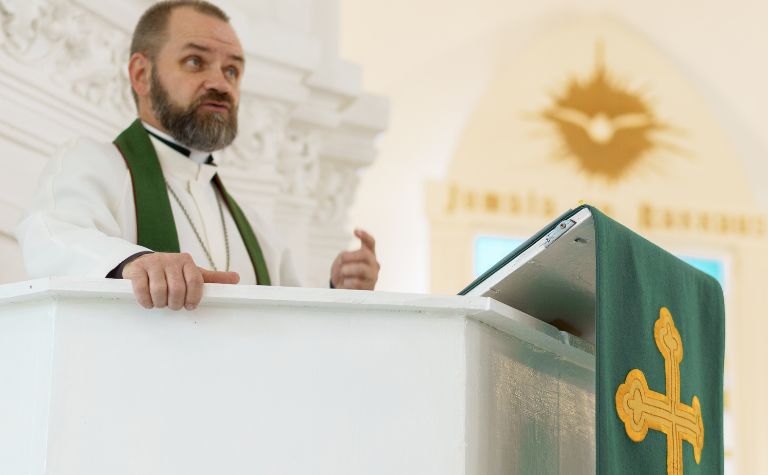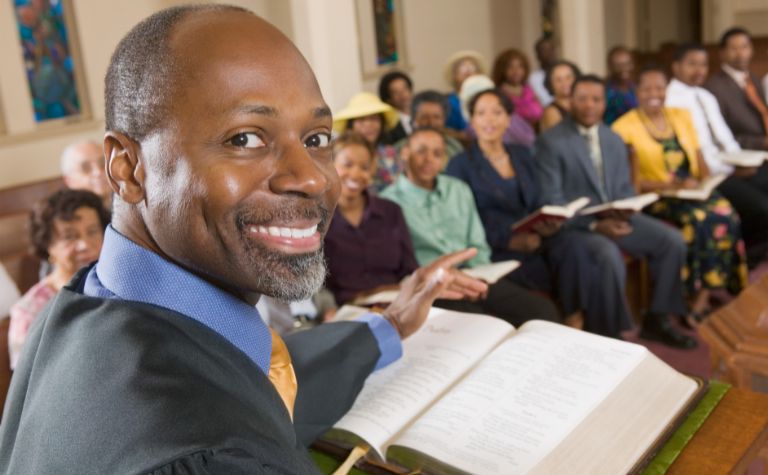In churches worldwide, ministers wear distinctive clothing that distinguishes them from their congregants. The style and color of their dress vary between denomination and tradition. Clergy in the Lutheran tradition often wear formal attire, and many people wonder if they wear collars like Catholic priests.
Many Lutheran ministers wear clerical collars, but the practice can vary by denomination and individual church. The collar has a significant symbolic meaning. Sometimes it’s the minister’s decision whether or not to wear a collar.
What is the rationale behind wearing a clerical collar, and why do pastors often pair it with black clothing? Is there any difference between the clothing of Lutheran ministers and Catholic priests? Read on to find answers to these questions and others about clerical clothing.
Also, see Lutheran vs. Reformed: What’s the Difference? to learn more.

Why Do Some Ministers Wear Clerical Collars?
Clergy in many Christian traditions wear a clerical collar, including Roman Catholics, Anglicans, Presbyterians, Lutherans, Methodists, and Eastern Orthodox. Although the rationale for each church and tradition differs slightly, some common reasons exist. (Also see Do Lutherans Call Their Pastors Father?)
Clerical collars signify a minister’s role in a church
Clerical collars symbolize the minister’s unique role within the church and society. Being a minister is no small undertaking, and particular articles of clothing, such as the clerical collar, tell those around the minister that he has dedicated their life to leading the church flock.
Those ministers or priests who wear the collar during services and throughout the week further remind their congregants of the perpetual nature of their unique role.
This practice can be especially effective if ministers wear the clerical collar in a place or area where no one personally knows them. (Also see the full article Do Lutheran Churches Have Priests?)
Strangers feel safe approaching the ministers with a need, question, or request simply because they recognize the collar as a sign of the ministry. In this way, the collar can serve as an evangelistic tool.
One Lutheran pastor writes, “As someone once put it, when a pastor wears a clerical collar in public he is proclaiming ‘God is open for business.’ There are other ways to do this, but for me, the simple, straightforward, and intentional wearing of a clerical collar provides a way to declare that.” [1]
Clerical collars convey holiness
Besides being a recognizable sign of leadership in the church, the clerical collar also holds specific symbolism. Almost without exception, the clerical collar is white. This color represents purity and the forgiveness of sins.
One of the primary jobs of a Christian minister is to preach the good news of forgiveness that Jesus’ sacrifice on the cross washes clean the sins of those who believe in him. (Also see Do Lutherans Believe in Predestination?)
Because the collar is the closest article of clothing to the minister’s mouth, the whiteness of the collar reminds the minister and the congregation of his role in preaching the Word of God to the congregation.
Typically, the darker shades of the rest of the pastor’s clothing reinforce this point by contrasting the whiteness of the collar. (Also see Lutheran vs Episcopalian: What’s the Difference?)
In 1865, a Presbyterian minister was the first to wear the collar to distinguish himself from his congregation. Eventually, other church traditions caught on, starting with the Anglicans and spreading throughout different denominations.
In general, churches with liturgical worship services still use the clerical collar, which goes by several other names, such as the clergy collar, the Roman collar, and, more informally, the dog collar. (Also see Lutheran vs Non-Denominational: What’s the Difference?)

Why Do Some Ministers Wear Black Clothing?
Another distinctive dress for the Christian minister is black or dark clothing. Again, there are multiple reasons for using this color. The most straightforward is that people associate black shirts, pants, and robes with church leadership.
Sometimes people who go to church seek a minister to counsel them in personal or theological matters. Uniform dress removes confusion concerning where to direct these concerns. (Also see Do Lutherans Pray for the Dead?)
Another benefit of ministers wearing black is that it removes cultural barriers regarding clothing style. Men of the cloth have been wearing black for hundreds of years amid ever-changing styles and preferences in clothing.
At the same time, as in the case of the clerical collar, black clothing also holds significant meaning. While the whiteness of the collar represents the spotlessness of the believer in Christ, the black attire reminds the pastor and the congregation of the reality of death and sin. (Also see Here is the Lutheran View on Marriage and Clergy)
In many important ways, leaders in the church choose death so their congregation might live. For instance, priests in the Catholic Church, with a few exceptions, may not marry.
Metaphorically, they put to death any possibility of a family in order, at least in the view of the Catholic Church, to better serve their flock.
In all Christian traditions, Catholic and Protestant ministers model for their congregants the daily practice of dying to oneself to live for God and his purposes. Many also associate the color black with humility.
One minister writes, “Symbolically black is associated with simplicity and humility and reminds priests of their need to imitate those virtues. Black is also a color that represents death and mourning and symbolizes how a priest is to die to oneself and decrease so that God may increase in his life. He is called to take up the cross of Our Lord daily, dying to sin so that he may rise in the life of grace.” [2]

The Attire of Lutheran Ministers and Catholic Priests: Compared
The clothing worn by Lutheran pastors and Catholic priests share many similarities, and many times are identical. This similarity is no accident, for Luther was a monk of the Augustinian order before initiating a global movement in Christianity. (Also see Do Lutherans Celebrate Lent?)
From the start, Luther wished to reform Christianity, not reinvent it in every particular. His measuring stick was the Bible; where it was silent, he revered the church’s traditions.
Accordingly, in many cases, he felt the need to keep the nature of the clothing of ministers the same. Lutheran pastors and Catholic priests regularly wear a combination of the same garments. For daily, non-liturgical clothing, ministers of both traditions often wear a white clerical collar with a black dress shirt.
However, within the Lutheran Church, especially in the United States, the extent to which ministers wear traditional formal clothing throughout the week varies depending on the region, minister, and local church. In the Catholic Church, there tends to be more uniformity. (Also see Do Lutherans Believe in Angels?)
What are vestments?
Vestments are garments that church leaders wear during liturgical services. Both Catholic and Lutheran leaders wear a combination of the cassock, stole, alb, and pectoral cross.
In addition to these items, Catholic priests sometimes wear other articles of clothing as well, such as the biretta or the cincture. In general, the garments worn by Catholic priests are more complicated than that of Lutheran ministers. [3]
References:
[1] Source
[2] Source
[3] Source
Related Questions
The Lutheran and Episcopalian traditions have profoundly impacted Protestant Christianity in Europe, the United States, and worldwide. Yet, these two branches of the Christian faith have similarities...
The Lutheran tradition is a 500-year-old branch of Protestant Christianity. Non-denominational churches are a fast-growing segment of evangelical Christianity, especially in the United States and...
